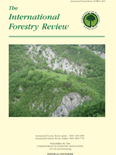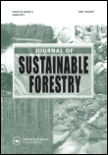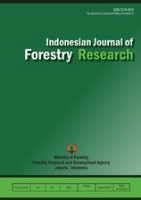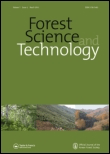
INTERNATIONAL FORESTRY REVIEW
Scope & Guideline
Navigating the Intersection of Ecology and Forestry
Introduction
Aims and Scopes
- Sustainable Forest Management:
The journal emphasizes the importance of sustainable practices in forestry, addressing the balance between ecological health, economic viability, and social equity. It examines various models and approaches to ensure forests are managed in a way that meets present needs without compromising the ability of future generations to meet their own. - Community Engagement and Participation:
A significant focus is placed on the role of local communities in forest management. Research often explores participatory governance, community-based management strategies, and the socio-economic impacts of forestry policies on indigenous and local populations. - Ecosystem Services and Biodiversity Conservation:
The journal highlights the importance of forests in providing ecosystem services, such as carbon sequestration, water regulation, and biodiversity conservation. Studies discuss methodologies for assessing these services and their implications for policy and management. - Policy and Governance:
Research published in the journal often delves into the complexities of forest governance, including the impacts of national and international policies on local management practices. It critiques existing frameworks and proposes innovative governance solutions. - Technological Innovations in Forestry:
The journal includes studies on the application of new technologies in forestry, such as remote sensing, GIS, and artificial intelligence, to improve management practices and monitoring of forest health.
Trending and Emerging
- Climate Change Adaptation and Mitigation:
Research on the impacts of climate change on forests and strategies for adaptation and mitigation is gaining traction. This includes studies on carbon sequestration, forest resilience, and the role of forests in climate policy, highlighting their importance in global climate strategies. - Indigenous Rights and Governance:
There is a growing emphasis on the rights and roles of Indigenous Peoples in forest management. Recent studies explore the integration of traditional knowledge into contemporary forestry practices and the effectiveness of Indigenous governance systems. - Digital Tools and Innovations:
The use of digital technologies, including remote sensing, big data analytics, and artificial intelligence, is becoming more prevalent in forestry research. These tools are being explored for their potential to enhance forest monitoring, management, and policy development. - Social Impacts of Forestry:
Emerging themes focus on the social dimensions of forestry, including the impacts of forestry on community well-being, gender dynamics in forest management, and the socio-economic implications of forest policies. This trend reflects a holistic understanding of forestry's role in societal contexts. - Forest Restoration and Rehabilitation:
Research on forest restoration initiatives, including reforestation and afforestation efforts, is on the rise. This includes studies exploring best practices, challenges, and the role of community involvement in restoring degraded forest ecosystems.
Declining or Waning
- Traditional Logging Practices:
Research focusing on conventional logging techniques is decreasing, as the journal shifts towards sustainable forestry practices and community-based management approaches. This reflects a broader trend away from industrial logging towards more holistic and sustainable methods. - Non-Timber Forest Products (NTFPs):
The interest in NTFPs has lessened, as the focus has moved towards ecosystem services and sustainable management practices that encompass broader environmental and community benefits. This shift indicates a growing recognition of the complexities involved in forest resource management. - Single-Species Forest Management:
There is a noticeable decline in studies concentrating solely on single-species management. The journal is increasingly prioritizing research that considers diverse ecosystems and multi-species interactions, aligning with contemporary conservation strategies.
Similar Journals

Journal of Sustainable Forestry
Cultivating a sustainable future through research and collaboration.Journal of Sustainable Forestry is a premier academic publication dedicated to advancing knowledge and practices in the field of sustainable forestry and environmental management. Published by Taylor & Francis Inc in the United Kingdom, this journal has been a cornerstone for researchers and professionals since its inception in 1992. With an impressive reputation, it boasts a 2023 Q2 ranking in Food Science, Forestry, and Geography, Planning and Development, highlighting its significant contribution to interrelated disciplines. The journal’s impact is further underscored by its Scopus ranking, especially in Forestry where it holds the 43rd position out of 174 publications, placing it in the 75th percentile. Although not open access, the journal remains committed to providing innovative research and practical insights into forest management, ecological sustainability, and policy development. As the field of sustainable forestry continues to evolve, the Journal of Sustainable Forestry serves as an essential resource for those committed to advancing sustainable practices globally, fostering a deeper understanding of how sustainable forestry can contribute to environmental resilience and biodiversity conservation.

Trees Forests and People
Empowering Research on Trees, Forests, and Their PeopleTrees, Forests and People is an esteemed peer-reviewed journal published by Elsevier that commenced its journey in 2020 and focuses on the intricate relationships between trees, forests, and human communities. With its E-ISSN of 2666-7193, this journal serves as a vital platform for presenting cutting-edge research in disciplines such as forestry, environmental science, and management. Recognized for its impact within the academic community, it has achieved a prestigious Q1 ranking in both Economics, Econometrics and Finance (Miscellaneous) and Forestry, alongside a Q2 ranking in Management, Monitoring, Policy and Law as of 2023. Its Scopus rankings indicate robust positioning in various fields, appealing to a diverse audience of researchers, professionals, and policy-makers engaged in sustainable forest management and ecosystem services. By offering open access options, the journal ensures that critical findings are readily available to a global audience, fostering knowledge sharing and collaborative efforts aimed at addressing the pressing challenges in forest conservation and management.

Indonesian Journal of Forestry Research
Pioneering ecological insights for a greener Indonesia.The Indonesian Journal of Forestry Research is a distinguished, peer-reviewed academic journal published by the Ministry of Environment & Forestry of Indonesia. With an ISSN of 2355-7079 and E-ISSN 2406-8195, this journal has been an Open Access platform since 2014, fostering international collaboration and knowledge sharing in the fields of ecology and forestry. As of 2023, the journal holds a respectable Q3 category in both Ecology and Forestry, reflecting its contribution to the science community. It ranks #99/174 in Forestry and #305/461 in Ecology in Scopus, indicating its growing influence in the respective fields. Aimed at researchers, professionals, and students, the Indonesian Journal of Forestry Research provides vital insights and findings, supporting sustainable forestry practices and environmental management in Indonesia and beyond. With an emphasis on innovative methodologies and applied research, this journal stands as a pivotal resource for those dedicated to advancing forestry science and ecological research.

Revista Forestal Mesoamerica Kuru-RFMK
Innovating practices for sustainable forest ecosystems.Revista Forestal Mesoamerica Kuru-RFMK is a vital academic platform dedicated to the advancement of forest science and management within the Mesoamerican region. Published by the Instituto Tecnológico de Costa Rica, this journal has been an Open Access resource since 2011, ensuring that critical research is accessible to a global audience. With an ISSN of 2215-2504, it aims to foster collaboration and knowledge exchange among researchers, professionals, and students eager to address the pressing challenges facing forests in Central America. The journal prioritizes interdisciplinary studies related to forest ecology, conservation, and sustainable management practices, making it an indispensable reference for anyone interested in enhancing forest health and biodiversity. By contributing to this resource, scholars can impact policy and practice while enriching the academic community’s understanding of Mesoamerica's unique forest ecosystems.

BOSQUE
Cultivating Insights for a Greener TomorrowBOSQUE, published by Universidad Austral de Chile, Facultad de Ciencias Forestales, stands as a pivotal platform for advancing the field of forestry and related environmental sciences. With an ISSN of 0717-9200, this journal has been committed to disseminating original research, reviews, and case studies essential for understanding forest ecosystems and management practices since its inception in 2006. As of 2023, it holds a Q3 ranking in the forestry category, showcasing a significant yet developing influence in the broader academic landscape, evidenced by its Scopus ranking placing it at the 12th percentile in Agricultural and Biological Sciences - Forestry. While boasting a diverse range of articles, BOSQUE promotes open access to a growing community of researchers, professionals, and students eager to contribute to sustainable forest management and conservation efforts. The journal continues to foster critical dialogue and innovation, making it an invaluable resource for those dedicated to enhancing forest sciences.

FORESTRY
Exploring the depths of forestry research since 1927.FORESTRY is a prestigious journal dedicated to the advancing knowledge and innovative practices in the field of forestry, published by Oxford University Press. Established in 1927, it encompasses a rich history of scholarly contributions and has evolved to maintain its relevance, addressing contemporary issues and research in forestry and related disciplines. With an impressive Q1 ranking in the category of Forestry, this journal holds a notable position within the Scopus rankings, being placed 20th out of 174 in the Agricultural and Biological Sciences domain, highlighting its significant impact with an 88th percentile standing. Researchers, professionals, and students can access critical insights into forestry management, ecology, and policy, facilitating informed decision-making and fostering sustainable practices. While Open Access options are currently not available, the journal's rigorous peer-review process ensures the publication of high-quality research that contributes both to academic advancement and practical applications in forestry worldwide. The comprehensive coverage from 1927 to 2024 makes FORESTRY an invaluable resource for anyone invested in enhancing the field of forestry.

Journal of Forest Research
Advancing sustainable forestry for a thriving planet.Welcome to the Journal of Forest Research, a pioneering publication dedicated to advancing the field of forestry and sustainable ecosystem management. Published by Taylor & Francis Ltd and boasting an impressive Q2 ranking within its category, this journal highlights significant research contributions and innovative practices in forest science. With an ISSN of 1341-6979 and E-ISSN of 1610-7403, the journal spans a fruitful history from 1996 and continues to be an influential platform up to 2024. The Scopus rank places it at an esteemed #55 out of 174 in the realm of Agricultural and Biological Sciences, reflecting its high impact within the community. While this journal is not open access, it offers targeted content for researchers, professionals, and students seeking to deepen their understanding of forest ecosystems and promote sustainable practices. Join us in exploring the intricate relationship between society and forests, and contribute to a crucial dialogue on environmental stewardship.

Madera y Bosques
Connecting Research with Real-World ImpactMadera y Bosques is a prominent academic journal specializing in the fields of forestry and wood science, published by INST ECOLOGIA A C in Mexico. With an ISSN of 1405-0471 and an E-ISSN of 2448-7597, it has established itself as a vital platform for disseminating research findings, innovative practices, and methodologies pertinent to sustainable forest management and ecological conservation. Operating since 2008, the journal covers a wide scope of topics related to the complexities of forest ecosystems, the importance of biodiversity, and the challenges posed by climate change. Despite its categorization in Q4 for the year 2023 in the Forestry category, Madera y Bosques aims to elevate discourse and practice in the field, providing a voice to emerging researchers and seasoned professionals alike. Additionally, the journal adheres to open access principles, enhancing the visibility and accessibility of its articles to a global audience. Researchers and practitioners are encouraged to engage with its rich content to further their understanding and impact in the world of forestry.

Forest Science and Technology
Advancing sustainable forestry through innovative research.Forest Science and Technology is a premier open access journal published by Taylor & Francis Ltd, based in the United Kingdom. Established in 2005, this journal has become a key platform for disseminating high-quality research in the fields of Forestry and Environmental Science, maintaining a strong impact factor and impressive Scopus rankings. As of 2023, it proudly holds a Q2 quartile ranking in Forestry and a Q3 quartile ranking in Management, Policy, and Law categories, highlighting its significance in addressing contemporary challenges in forest management and conservation. With a dedication to fostering scholarly communication, the journal supports open access since 2017, making valuable findings accessible to a wider audience, including researchers, professionals, and students. With the coverage period extending to 2024, Forest Science and Technology continues to contribute to the discourse on sustainable forestry practices and innovative management strategies.

Kastamonu University Journal of Forestry Faculty
Advancing sustainable forestry knowledge for a greener future.Kastamonu University Journal of Forestry Faculty, published by KASTAMONU UNIV, is a prestigious open-access journal dedicated to advancing knowledge in the field of forestry and environmental sciences. Established in 2001, this journal provides a vital platform for researchers, professionals, and students to share their findings and insights on topics such as sustainable forest management, ecological restoration, and forestry education. Its commitment to open access ensures that groundbreaking research is readily available to a global audience, fostering collaboration and innovation in the field. Although specific metrics such as HIndex are currently not available, the journal continues to strive towards increasing its visibility and impact within academic circles. With a strong focus on promoting scholarly exchange, the Kastamonu University Journal of Forestry Faculty plays a crucial role in enhancing the scientific discourse surrounding forestry issues at both local and international levels.